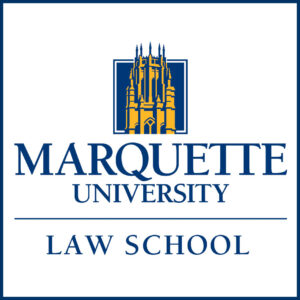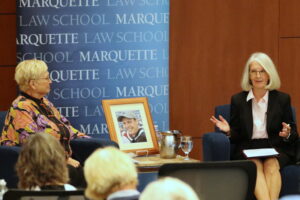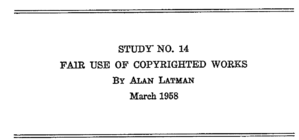The Marquette Volunteer Legal Clinic(s)—A True Legal Community Effort
 The spirit and ideals underlying Marquette Law School’s embrace of pro bono work are timeless—part of our Catholic, Jesuit heritage and mission and reflecting the best traditions of the legal profession. Yet there are some key dates in our history, and, without doubt, one of them is from just more than 20 years ago.
The spirit and ideals underlying Marquette Law School’s embrace of pro bono work are timeless—part of our Catholic, Jesuit heritage and mission and reflecting the best traditions of the legal profession. Yet there are some key dates in our history, and, without doubt, one of them is from just more than 20 years ago.
Specifically, in 2001, a group of individuals began the Marquette Volunteer Legal Clinic (MVLC). Julie Darnieder, L’78, alluded to this background in a blog post a number of years later, and I remain grateful to all of the individuals involved in launching the initiative.
My purpose here is not to recount the story but rather—on the cusp of the ABA’s National Celebration of Pro Bono week—first to note the continuing prominence of the MVLC in our now much-expanded pro bono work. Indeed, Angela F. Schultz, assistant dean for public service, has taught me to refer to the MVLCs (plural). For we now offer the following locations (and times):
- Mondays, 1:00–3:00 p.m., on Zoom
- Mondays, 4:00–6:00 p.m., at the Milwaukee County Veterans Service Office
- Tuesdays, 1:00–3:00 p.m., at the House of Peace
- Wednesdays, 1:30–3:30 p.m., at the Milwaukee Justice Center
- Wednesdays, 5:00–7:00 p.m., at the United Community Center
- Thursdays & Fridays, 9:00–11:00 a.m., at the Milwaukee Justice Center
- Thursdays, 1:00–3:00 p.m., on Zoom
- And host sites interested in bringing the legal clinic services to them can request a visit from volunteers on the Mobile Legal Clinic.
Permit me to emphasize, second, that we are dependent on—and grateful to—the many lawyers in this community who enable us to operate the MVLCs. After all, our students, who are there with them, do not yet have law licenses.
The lawyers volunteering each day come from a range of practices, law schools, and experiences. Some volunteers have had long careers—Herb Bratt, retired from full-time law practice but a frequent volunteer, graduated from Yale Law School in 1956. Others are newer to the practice: Jordan Jozwik, an associate at Reinhart Boerner Van Deuren, graduated from Marquette Law School in May 2022. Within weeks, she had done her first MVLC shift—as an attorney (she volunteered often as a law student).
Remarkably, of the 230 lawyer volunteers in the past year, exactly 115 were Marquette lawyers, while the other half graduated from other law schools. The latter group would form a long list, including the law schools at universities such as Cornell, Creighton, Duke, Emory, Georgetown, Harvard, Indiana, Iowa, Michigan, Northwestern, Tulsa, Vermont, William Mitchell, and Wisconsin (Madison).
We recently surveyed all these lawyers about their “reasons for engaging in pro bono with the Marquette Volunteer Legal Clinics.” Simply stated here, it is evident that all of them regard it as a privilege to serve the MVLC clients (in the brief-legal-advice format of the clinic) and to help develop the knowledge, skills, and values of our students.
Indeed, a prevailing theme is that the practicing lawyers regard themselves as getting more than they are giving from the experience. From the Marquette Law School end, truly, we could not operate the MVLCs without the many civic-minded lawyers in this area who already know, from their volunteering, “how great this is” (in the words of one respondent to the recent survey).
Kudos—and thank you—to all our attorney volunteers. To learn how to join with them—and with our students—by volunteering with the Marquette Volunteer Legal Clinics, visit our website.

 On October 11, 2022, the Marquette Law Andrew Center for Restorative Justice held a public conversation with Mary Kay Balchunas, a mother whose son, a police officer, was murdered in 2004. Professor Janine Geske focused on the positive impact restorative justice can have for surviving victims. She asked Mary Kay to introduce her son to the audience and describe what happened to him. Mary Kay’s son, Jay, was covering an undercover shift for a colleague. Jay stopped to get a cup of coffee before starting his shift around 3 a.m. when two boys came up to him, intending to rob him. Anthony Bolden, stood behind Jay while Dionne Renolds stood in front of Jay, pointing a gun towards him. Anthony Bolden went to search Jay for his wallet and felt Jay’s gun. Immediately Anthony alerted his accomplice. At that point, Dionne shot Jay, which resulted in Jay’s death. Jay’s bullet proof vest, which he promised his mother he would always wear on duty, was sitting in the front seat of his undercover car. His vest was still on Jay’s front seat as his shift had not started.
On October 11, 2022, the Marquette Law Andrew Center for Restorative Justice held a public conversation with Mary Kay Balchunas, a mother whose son, a police officer, was murdered in 2004. Professor Janine Geske focused on the positive impact restorative justice can have for surviving victims. She asked Mary Kay to introduce her son to the audience and describe what happened to him. Mary Kay’s son, Jay, was covering an undercover shift for a colleague. Jay stopped to get a cup of coffee before starting his shift around 3 a.m. when two boys came up to him, intending to rob him. Anthony Bolden, stood behind Jay while Dionne Renolds stood in front of Jay, pointing a gun towards him. Anthony Bolden went to search Jay for his wallet and felt Jay’s gun. Immediately Anthony alerted his accomplice. At that point, Dionne shot Jay, which resulted in Jay’s death. Jay’s bullet proof vest, which he promised his mother he would always wear on duty, was sitting in the front seat of his undercover car. His vest was still on Jay’s front seat as his shift had not started. The AWF oral argument was yesterday morning —
The AWF oral argument was yesterday morning —